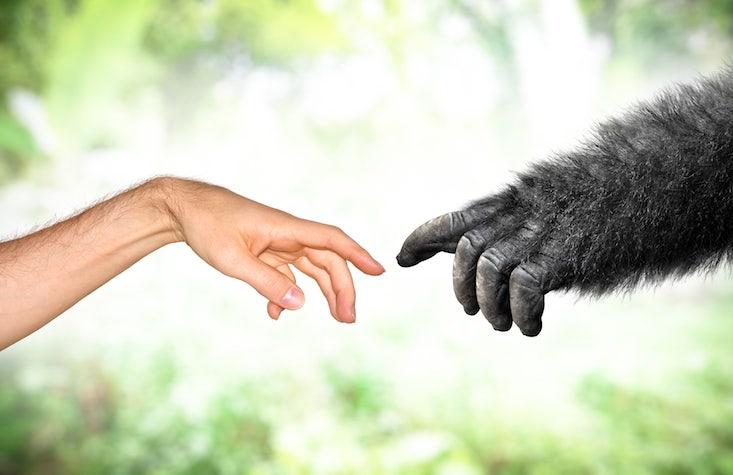
My high school biology teacher, Mr. Whittington, put a framed picture of a primate ancestor in the front of his classroom—a place of reverence. In a deeply religious and conservative community in rural America, this was a radical act. Evolution, among the most well-supported scientific theories in human history, was then, and still is, deliberately censored from biological science education. But Whittington taught evolution unapologetically, as “the single best idea anybody ever had,” as the philosopher Dan Dennett described it. Whittington saw me looking at the primate in wonder one day and said, “Cristine, look at its hands. Now look at your hands. This is what common descent looks like.”
Evolution has shaped the human body, but it also shaped the human brain, so evolutionary principles are indispensable for understanding our psychology. Yet many students, teachers, and even social scientists struggle to see how our evolutionary history significantly shapes our cognition and behavior today. “Learning” and “culture” do not explain behavior so completely that turning to ideas from evolution is unnecessary. The lack of willingness to view human cognition and behavior as within the purview of evolutionary processes has prevented evolution from being fully integrated into the social science curriculum.
A deeper scientific understanding leads to the view that learning doesn’t compete with evolution as an explanation for human psychology. Learning requires evolved psychological adaptations—general learning mechanisms or mechanisms which may be specific to a particular adaptive problem. Specialized learning mechanisms help us avoid eating toxic food, yet no one is born knowing which particular foods to avoid. Humans have also evolved an aversion to mating with their genetic kin but are not born knowing who their kin are. Solving these adaptive challenges requires evolved psychological learning mechanisms.
Our technological complexity is the outcome of our species’ capacity for cumulative culture.
Human cognition and behavior is the product of the interaction of genetic and cultural evolution. Gene-culture co-evolution has allowed us to adapt to highly diverse ecologies and to produce cultural adaptations and innovations. It has also produced extraordinary cultural diversity. In fact, cultural variability is one of our species’ most distinctive features. Humans display a wider repertoire of behaviors that vary more within and across groups than any other animal. Social learning enables cultural transmission, so the psychological mechanisms supporting it should be universal. These psychological mechanisms must also be highly responsive to diverse developmental contexts and cultural ecologies.
Take the conformity bias. It is a universal proclivity of all human psychology—even very young children imitate the behavior of others and conform to group norms. Yet beliefs about conformity vary substantially between populations. Adults in some populations are more likely to associate conformity with children’s intelligence, whereas others view creative non-conformity as linked with intelligence. Psychological adaptations for social learning, such as conformity bias, develop in complex and diverse cultural ecologies that work in tandem to shape the human mind and generate cultural variation.
Truly satisfying explanations of human behavior requires identifying the components of human cognition that evolution designed to be sensitive to social or ecological conditions and information. For example, populations in which food resources show high variance (large game hunting is very much hit or miss) tend to evoke cooperative adaptations for group-wide sharing compared to those in which food variance is lower and more dependent on individual effort, like gathered foods. Recent discoveries in the field of cultural evolution have demonstrated that our technological complexity is the outcome of our species’ capacity for cumulative culture. It has set our genus Homo on an evolutionary pathway remarkably distinct from the one traversed by any other species. In a paper last year, I proposed that this was a result of psychological adaptations being universal but sufficiently flexible for innovations to build on each other, supporting the acquisition of highly variable behavioral repertoires.
Applying evolutionary theory to social science has the potential to transform education and, through it, society. For example, evolutionary perspectives can help social scientists understand, and eventually address, common social problems. Schoolyard bullying provides one example. Without an evolutionary understanding of the phenomenon, interventions are likely to be ineffective, since they misdiagnose the causes of bullying. Bullying is not merely negative interpersonal behavior; it’s goal-oriented and serves the social function of gaining status and prestige for the bully, which must be understood to combat it. For example, bullying often occurs in front of an audience, suggesting that social attention drives, and may reinforce, the behavior. A 2015 paper suggests most interventions don’t work because they remove the rewards of bullying—increased social status—without offering any alternatives. The researchers recommend that the esteem bullies seek “should be borne in mind when engineering interventions” designed to either decrease a bully’s social status or channel the bully’s social motivations to better ends. A deep understanding of the evolved functions of bullying, in short, provides a fulcrum for potential remedies.
If “nothing in biology makes sense except in the light of evolution,” as the evolutionary biologist Theodosius Dobzhansky argued in 1973, then nothing in human psychology, behavior, and culture does either. Social scientific research should reflect this fact.
Cristine Legare is an associate professor of psychology and the director of the Evolution, Variation, and ontogeny of Learning Laboratory at The University of Texas at Austin. Her research examines how the human cognitive system enables us to learn, create, and transmit culture. She conducts comparisons across age, culture, and species to address fundamental questions about cognitive and cultural evolution. Follow her on Twitter @CristineLegare.